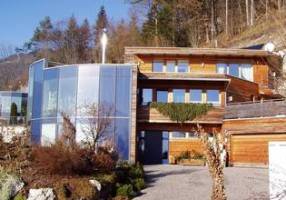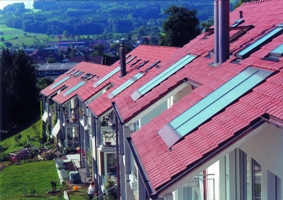“We Were Clearly in Need of the Incentive Programme”
June 22, 2009
Solarthermalworld.org spoke with Manuel Collares-Pereira, R&D director of the Portuguese collector manufacturer Aosol, about the development of his company and the Portuguese solar thermal incentive programme. Photo: Aosol
? I heard some rumours that your company will abandon its solar thermal business. Is this true?
Collares-Pereira: Not true, quite on the contrary: We are just having a temporary production stop in order to concentrate on restructuring our activities. In the meantime, we finalised our development of the next generation of CPC collectors, which will be used in areas beyond domestic hot water applications, such as heating and cooling, process heat, desalination, etc. CPC flat plate collectors are in fact a potentially cheaper choice for these higher temperature applications. We also developed a small 8 kW ammonia water, air-cooled absorption cooling machine, which can be combined with our CPC collectors or with any other collector that supplies temperatures at 95 °C or above.
? What was the aim of your restructuring?
Collares-Pereira: The idea was to concentrate on being a product development company and solar thermal solutions provider, and not a collector manufacturer. Born in a small country with a small solar market, always at the brink of true growth, but, in the end, always falling short of it, we could never have achieved manufacturing conditions that would have proved to be cost-effective. So, we decided to find a large-scale solar collector manufacturer able to fabricate our products at a lower cost and established a partnership to gain a much more solid presence on the market – even beyond the borders of Portugal. This strategy bears its first fruits now.
 Beyond the limits of a domestic use of hot water: This CPC flat plat collector field supplies the public swimming pool in the Portuguese town of Vila Viçosa with hot water and heating. Photo: Aosol
Beyond the limits of a domestic use of hot water: This CPC flat plat collector field supplies the public swimming pool in the Portuguese town of Vila Viçosa with hot water and heating. Photo: Aosol
? It seems that you are not satisfied with the new incentive programme in Portugal?
Collares-Pereira: No, we welcomed the initiative from the beginning, since it was the first time that such a real incentive programme was set up in Portugal. And we were clearly in need of such an initiative. It somehow started off on the wrong foot, but the initial criticisms produced results: the programme became more transparent and is now going better than before. It is our intention to already get the programme’s approval of our certified CPC collectors and systems in July, certainly in August.
? Is the market picking up now?
Collares-Pereira: The Portuguese solar thermal market has been – and is still – very small compared to the markets in other southern European countries. Since July 2006, solar thermal energy for domestic hot water has been compulsory in new buildings and the market in 2007 showed signs of growth. We, however, are facing a crisis in the buildings construction sector. The law is therefore no longer a driving force for this growth.
In the meantime, the incentive programme has created demand for solar systems in existing households, which is a good compensation for the building crisis. Since the effects of these events run in opposite directions, it is presently hard to say whether the market is really going up.
I would also like to comment on the solar obligation. It has not been set up in the best way, since it requires 1 m2/per person. This requirement does not provide for the quality and adequate performance of new solar thermal installations. We are hoping that there will soon be a revision of that requirement – adopting a lower limit for the energy yield that the domestic solar hot water system has to supply per year and per person.
The interview was conducted by Bärbel Epp.
More information: http://www.aosol.pt


